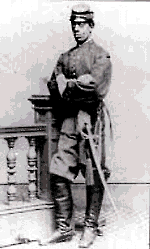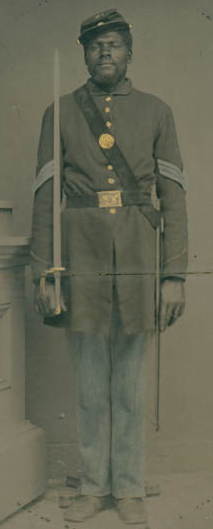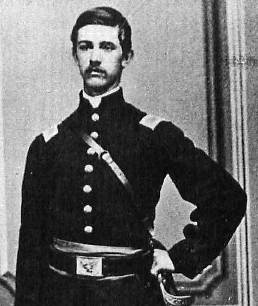
Mercury, April 21, 1863 [OAF]
Camp Meigs, Readville, April 18Messrs. Editors:
—The past week has been marked by nothing extraordinary with us here, excepting a share of fine weather, which must be considered out of the “common order of things” compared with the mud and mire experienced all spring. The total number of men in camp is now 674, making an increase of 60 men for the week; but they do not come fast enough for the boys who are here. We want to get the regiment full, and show that we are men. Certainly there are some here who would be as well suited if they were away, and the majority of the men would be very glad if they were drummed out. They differ none though, in that respect, from other regiments. So long as patriotism was made a purchaseable article there were plenty of men to fill the ranks, but now, when it is not a “paying concern” nobody cares much about going. But our people must consider that their position is a very delicate one; the least false step, at a moment like the present, may tell a dismal tale at some future day. Let them consider that a chance to obtain what they have “spouted” for in “convention assembled” now presents itself by works, not by words! And let them remember that the Greeks lost their liberties by “too much talk”; thinking that talking would accomplish more than fighting; but they saw their mistake when it was too late. Let our people beware. Their fate will be worse than that of the Greeks, if they do not put forth an effort now to save themselves.
As one of the race, I beseech you not to trust to a fancied security, laying comfort to your minds, that our condition will be bettered, because slavery must die. It depends on the free black men of the North, whether it will die or not — those who are in bonds must have some one to open the door; when the slave sees the white soldier approach, he dares not trust him and why? because he has heard that some have treated him worse than their owners in rebellion. But if the slave sees a black soldier, he knows he has got a friend; and through friendship, he that was once a slave can be made a soldier, to fight for his own liberty. But allow that slavery will die without the aid of our race to kill it — language cannot depict the indignity, the scorn, and perhaps violence, that will be heaped upon us; unthought of laws will be enacted, and put in force, to banish us from the land of our birth; and European governments, who now dare not recognize the Southern Confederacy, will call the ostracism a just measure. Now is the time to act — emulate the men of Pennsylvania, who have left their homes in numbers to shame the colored men of the “Old Bay State,” the “Cradle of Liberty.” This regiment should be filled now, with what is wanted to fill it, 326 more men, from Massachusetts; and if our people will only take hold of the matter in earnest it can be done. Let the young women drive all those young loungers off to the war, and if they won’t go, say “I’m no more gal of thine.” There are a plenty of young men in Boston, New Bedford, and other smaller places in the State to fill this regiment up in a very short time. We want them to feel as though they must go, not go purposely for a bounty, but go for honor, duty and liberty.
We were beautifully sold last Wednesday. It was rumored about the Camp that Governor Andrew was to visit the Camp; so the boys all thought of course they must have everything in apple-pie order; we had the barracks all cleaned and hung with holly, and everything looked splendidly. But it turned out that some of the companies wanted to prove which was the smartest.
J. H. G.
[1863-04-18] INTERESTING FROM THE SOUTH.; ALL QUIET AT CHARLESTON.



